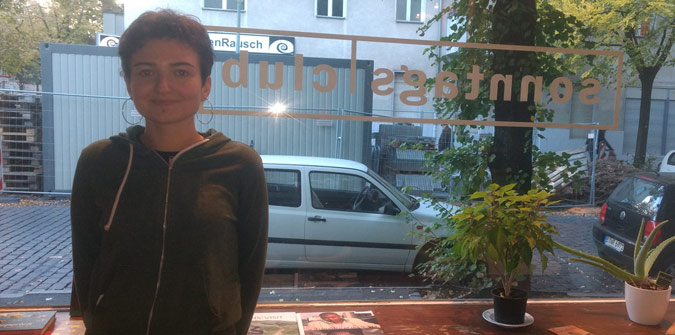

DiversCity of Emotion
Gülce
Istanbul, Turkey
Supervisor: Ane; Mentor: Eszter Kadar
10/2018-09/2019
I am Gülce, 22 years old, coming from Istanbul to do an EVS project with Sonntags-Club. My journey to here was quite
complicated. The year before I started in the ECS-program I applied for an internship but my visa was not accepted.
Then I e-mailed Ane again this time about the volunteer program and she was very supportive with the whole painful
slow process of collecting all the documents and now - finally - I am here for the project DiversCity of Emotion!
With the project DiversCity of Emotion I want to focus on emotional outcomes of stigmatization and discrimination
in a multicultural place like Berlin. Emotions that come from being "the other" whether it is something visible or
something invisible to society; anything unacceptable to certain norms. How do we feel in everyday life because of
judgements and shame that is coming from outside and how different people are dealing with it? How hierarchical are
even certain emotions and are there negative connotations in our minds? Why are some things good to feel while others
are not? Why are some emotions more acceptable than others? These questions have been in my mind for a long time and
I wanted to know how we can deal with our emotions even when we cannot be sure whether they are our emotions or not.
During the first month at the Sonntags-Club I was looking for ways to express and understand the whole topic better
and I discovered that a "clown" would be a perfect fit. A clown has always problems and in the end s/he wasn't a good
clown if s/he didn`t struggle. Being a clown is always about emotions and always about showing them without
auto-control that is put inside us by the normative society. So I think showing a clown is a healthy way to
reflect on ourselves and lives. Therefore I decided to do a clown show on the Sonntags-Club stage with a professional
clown friend of mine, Judith. Later I will organize a workshop for queer folks using the exercises we use during the
trainings. They help us to receive, understand and react on emotions. This makes them great exercises considering my
topic.
Mostly I want to play with the emotions "shame" and "guilt" during the workshop. They are very complex and deeply
rooted concepts that play a substantial part in the process of discrimination and creating "the other".
